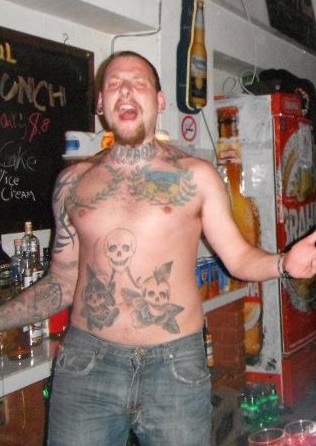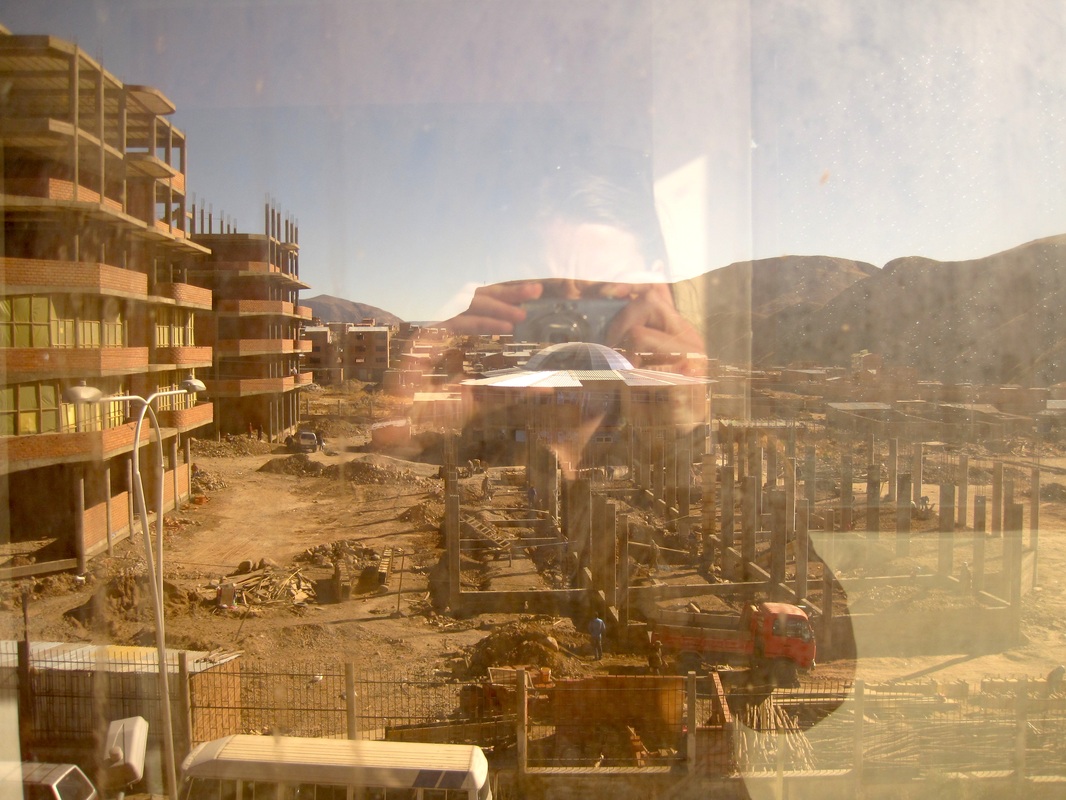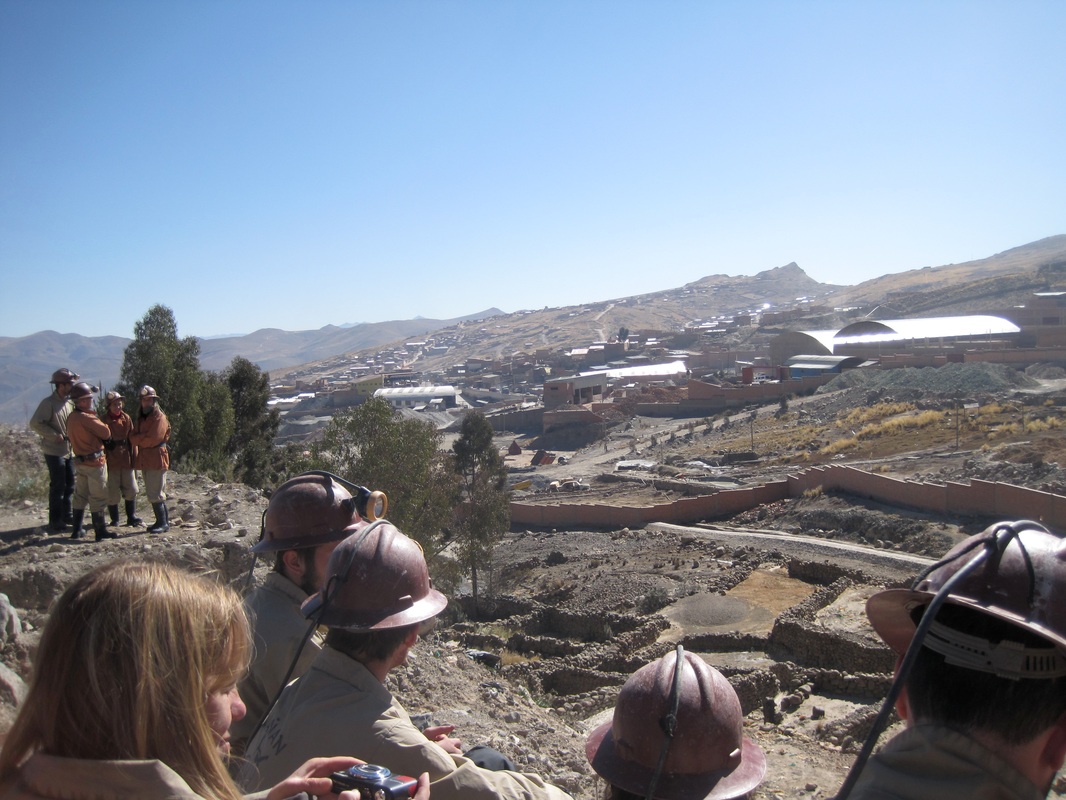The first time I saw Alec was over a year ago. I watched a tall Eastern European man walk out of the hostel office. He was covered in tattoos, and had several prominent facial piercings. He carried a laptop case. I assumed he was in his mid thirties. I only later found out he was 22. The first time I spoke to him was my friend Amanda’s birthday party, when he kept several of us in the bar well after closing, forcing vodka and whiskey shots down our gullets. “No puedes obligarme a beber. No soy tu empleada” I shouted between Jameson shots. But then the next week I started working for him.
So, when Alé told me Alec was beckoning, I was slightly nervous. But as I walked over he asked if I would do him a favor. I assumed this involved washing some high ball glasses or getting more tequila from the storage room. But when I said “sure,” he told me he was sending me to Potosí.
Potosí is not the type of place one dreams of being sent for a business trip. It sits at 4090 meters above sea level giving it an almost arctic climate. And most buildings have no central heat. Its principal (possibly only real) industry is mining, which is almost entirely unregulated. The local beer, Potosiña has a strange hint of burnt bacon in its flavor. There is no airport, so to get there from La Paz, one takes a 10 hour, over night bus ride. Usually the bus has no heat. But as many people will enthusiastically declare, “At least the road is paved the whole way!”
And so, early Monday morning, I arose, despite the fact that it was feriado, and went off to buy a bus ticked. But of course, given the holiday, most tour operators were closed, and I had to go to the bus station in person. After finally acquiring a ticket and relieving everyone involved in the operation, I went back to the hostel for the real preparations. Strapping $50,000 in cash to my abdomen.
It’s all the Central Bank of Argentina's fault. Potosí is (relatively) near the border with Argentina, and the company that owns the hostel is building a new one in Salta. When money is transferred into Argentinian bank accounts, it is automatically converted into Pesos. But most high-end purchases: property, building materials, the things that go into making a new hostel, are exchanged for dollars. So when the pesos are converted back to dollars, you end up losing around 10%. For sums in the tens of thousands of dollars, that’s a lot to lose.
So instead, I was off to meet Carrie and 4 Argentines, who would cross the border with the legal maximum of $10,000 each in their possession. But to get there I had to sit for ten hours on a South American bus, driving through the freezing night, without heat, and unable to sleep—partially because I had was seemed to be a square pregnancy beneath my hoodie and down coat that occasionally pinched my skin if I moved the wrong way, partially because I was paranoid of being mugged. But I got on the bus and discovered the seat next to me was vacant. I stretched my legs diagonally. I took out the book a Dutch girl I met several months before had left me. I flipped on my light. Except it wouldn’t turn on. Of course, too much to ask for the seat lights to actually work. So I stared out the window at the black night. At the stars, at the car lights that passed every twenty or minutes or so. And finally, sometime around 3 am I drifted off to sleep.
At 6 am we arrived. It was still pitch black outside, and my 3 hours of sleep left me disoriented rather than refreshed. But as I stepped off the bus, a bubbly, blonde Canadian girl called my name. She hugged me and told me how glad she was to see me. We had never met before, but she had been standing outside in the 14 degree F night to greet me. She worried I hadn’t bought the ticket or I had missed the bus. She worried I had run off with the money. She worried we’d miss each other in the night and I’d get mugged. Her imagination, like mine, was running wild with what could happen to $50,000 on a Bolivian bus.
But we found each other and walked the 200 meters to the Alojamiento she and the Argentines were staying in. The doors had been padlocked for the night and it took about 5 full minutes of banging to wake the security guard. He finally let us in, as my ungloved hands were on the verge of frostbite. It was only marginally warmer inside. Carrie banged on the door of the room where Marc Antonio, the construction manager, and Ernesto, the driver were sleeping. We went up a flight of stairs and went into the room where Carrie had stayed with Marc Antonio’s two teenage daughters. The room, despite having no windows, felt only marginally warmer than it had been outside. But I removed my puffy layers and revealed the two money belts that covered my belly. I took them off and we pulled out the staples Alec had used to “secure” them. We unzipped them, and since they had already been full when I first saw them and put them around my body, I saw the most cash I had ever seen. And possibly ever will.
In the end, Carrie and the Argentines took their loot. And I slept a few hours before walking back to the bus station and buying a return ticket.



 RSS Feed
RSS Feed
